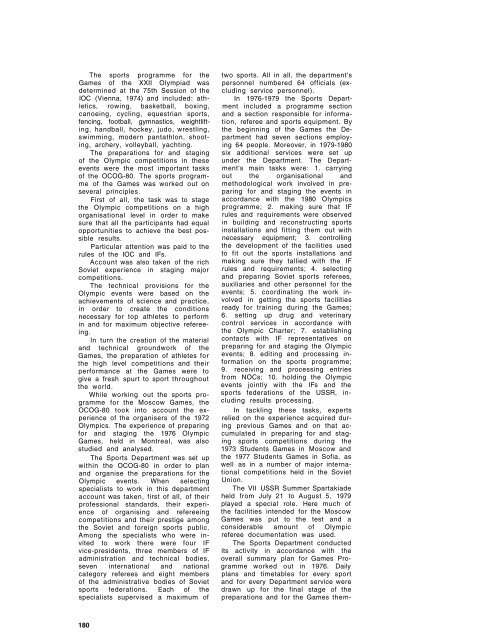or1980v2pt1
or1980v2pt1
or1980v2pt1
You also want an ePaper? Increase the reach of your titles
YUMPU automatically turns print PDFs into web optimized ePapers that Google loves.
The sports programme for the<br />
Games of the XXII Olympiad was<br />
determined at the 75th Session of the<br />
IOC (Vienna, 1974) and included: athletics,<br />
rowing, basketball, boxing,<br />
canoeing, cycling, equestrian sports,<br />
fencing, football, gymnastics, weightlifting,<br />
handball, hockey, judo, wrestling,<br />
swimming, modern pantathlon, shooting,<br />
archery, volleyball, yachting.<br />
The preparations for and staging<br />
of the Olympic competitions in these<br />
events were the most important tasks<br />
of the OCOG-80. The sports programme<br />
of the Games was worked out on<br />
several principles.<br />
First of all, the task was to stage<br />
the Olympic competitions on a high<br />
organisational level in order to make<br />
sure that all the participants had equal<br />
opportunities to achieve the best possible<br />
results.<br />
Particular attention was paid to the<br />
rules of the IOC and IFs.<br />
Account was also taken of the rich<br />
Soviet experience in staging major<br />
competitions.<br />
The technical provisions for the<br />
Olympic events were based on the<br />
achievements of science and practice,<br />
in order to create the conditions<br />
necessary for top athletes to perform<br />
in and for maximum objective refereeing.<br />
In turn the creation of the material<br />
and technical groundwork of the<br />
Games, the preparation of athletes for<br />
the high level competitions and their<br />
performance at the Games were to<br />
give a fresh spurt to sport throughout<br />
the world.<br />
While working out the sports programme<br />
for the Moscow Games, the<br />
OCOG-80 took into account the experience<br />
of the organisers of the 1972<br />
Olympics. The experience of preparing<br />
for and staging the 1976 Olympic<br />
Games, held in Montreal, was also<br />
studied and analysed.<br />
The Sports Department was set up<br />
within the OCOG-80 in order to plan<br />
and organise the preparations for the<br />
Olympic events. When selecting<br />
specialists to work in this department<br />
account was taken, first of all, of their<br />
professional standards, their experience<br />
of organising and refereeing<br />
competitions and their prestige among<br />
the Soviet and foreign sports public.<br />
Among the specialists who were invited<br />
to work there were four IF<br />
vice-presidents, three members of IF<br />
administration and technical bodies,<br />
seven international and national<br />
category referees and eight members<br />
of the administrative bodies of Soviet<br />
sports federations. Each of the<br />
specialists supervised a maximum of<br />
180<br />
two sports. All in all, the department's<br />
personnel numbered 64 officials (excluding<br />
service personnel).<br />
In 1976-1979 the Sports Department<br />
included a programme section<br />
and a section responsible for information,<br />
referee and sports equipment. By<br />
the beginning of the Games the Department<br />
had seven sections employing<br />
64 people. Moreover, in 1979-1980<br />
six additional services were set up<br />
under the Department. The Department's<br />
main tasks were: 1. carrying<br />
out the organisational and<br />
methodological work involved in preparing<br />
for and staging the events in<br />
accordance with the 1980 Olympics<br />
programme; 2. making sure that IF<br />
rules and requirements were observed<br />
in building and reconstructing sports<br />
installations and fitting them out with<br />
necessary equipment; 3. controlling<br />
the development of the facilities used<br />
to fit out the sports installations and<br />
making sure they tallied with the IF<br />
rules and requirements; 4. selecting<br />
and preparing Soviet sports referees,<br />
auxiliaries and other personnel for the<br />
events; 5. coordinating the work involved<br />
in getting the sports facilities<br />
ready for training during the Games;<br />
6. setting up drug and veterinary<br />
control services in accordance with<br />
the Olympic Charter; 7. establishing<br />
contacts with IF representatives on<br />
preparing for and staging the Olympic<br />
events; 8. editing and processing information<br />
on the sports programme;<br />
9. receiving and processing entries<br />
from NOCs; 10. holding the Olympic<br />
events jointly with the IFs and the<br />
sports federations of the USSR, including<br />
results processing.<br />
In tackling these tasks, experts<br />
relied on the experience acquired during<br />
previous Games and on that accumulated<br />
in preparing for and staging<br />
sports competitions during the<br />
1973 Students Games in Moscow and<br />
the 1977 Students Games in Sofia, as<br />
well as in a number of major international<br />
competitions held in the Soviet<br />
Union.<br />
The VII USSR Summer Spartakiade<br />
held from July 21 to August 5, 1979<br />
played a special role. Here much of<br />
the facilities intended for the Moscow<br />
Games was put to the test and a<br />
considerable amount of Olympic<br />
referee documentation was used.<br />
The Sports Department conducted<br />
its activity in accordance with the<br />
overall summary plan for Games Programme<br />
worked out in 1976. Daily<br />
plans and timetables for every sport<br />
and for every Department service were<br />
drawn up for the final stage of the<br />
preparations and for the Games them-


